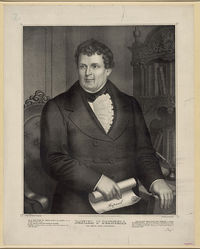Annotation:O'Connell's Farewell to Dublin (1): Difference between revisions
No edit summary |
m (Text replacement - "garamond, serif" to "sans-serif") |
||
| Line 1: | Line 1: | ||
=='''Back to [[{{BASEPAGENAME}}]]'''== | =='''Back to [[{{BASEPAGENAME}}]]'''== | ||
---- | ---- | ||
<p><font face=" | <p><font face="sans-serif" size="4"> | ||
'''O'CONNELL'S FAREWELL TO DUBLIN [1]''' (Slán Uí Chonaill le Baile Átha Cliath). Irish, Reel. A Dorian. Standard tuning (fiddle). AABBCC. The title honors Daniel O'Connell (1775-1847), a Catholic barrister who in 1823 founded the Catholic Association to champion the cause of emancipation for the island's Catholic population. His campaign became a popular movement, gained momentum and key support in England, and resulted in Westminster passing the Catholic Emancipation Act in 1829. At the height of his power O'Connell was the most famous man in Ireland, routinely vilified in '''Punch''' but called "The Liberator" to the common folk of Ireland. | '''O'CONNELL'S FAREWELL TO DUBLIN [1]''' (Slán Uí Chonaill le Baile Átha Cliath). Irish, Reel. A Dorian. Standard tuning (fiddle). AABBCC. The title honors Daniel O'Connell (1775-1847), a Catholic barrister who in 1823 founded the Catholic Association to champion the cause of emancipation for the island's Catholic population. His campaign became a popular movement, gained momentum and key support in England, and resulted in Westminster passing the Catholic Emancipation Act in 1829. At the height of his power O'Connell was the most famous man in Ireland, routinely vilified in '''Punch''' but called "The Liberator" to the common folk of Ireland. | ||
[[File:DanielO'Connell.jpg|200px|thumb|left|Daniel O'Connell. His image was on the old Irish £20 notes, prior to the country's adoption of the Euro.]] | [[File:DanielO'Connell.jpg|200px|thumb|left|Daniel O'Connell. His image was on the old Irish £20 notes, prior to the country's adoption of the Euro.]] | ||
| Line 7: | Line 7: | ||
<br> | <br> | ||
</font></p> | </font></p> | ||
<p><font face=" | <p><font face="sans-serif" size="4"> | ||
''Source for notated version'': the late fiddler Martin "Junior" Crehan, 1959 (Miltown Malbay, County Clare, Ireland) [Breathnach]. | ''Source for notated version'': the late fiddler Martin "Junior" Crehan, 1959 (Miltown Malbay, County Clare, Ireland) [Breathnach]. | ||
<br> | <br> | ||
<br> | <br> | ||
</font></p> | </font></p> | ||
<p><font face=" | <p><font face="sans-serif" size="4"> | ||
''Printed sources'': Breathnach ('''CRÉ II'''), 1976; No. 231, p. 120. | ''Printed sources'': Breathnach ('''CRÉ II'''), 1976; No. 231, p. 120. | ||
<br> | <br> | ||
<br> | <br> | ||
</font></p> | </font></p> | ||
<p><font face=" | <p><font face="sans-serif" size="4"> | ||
''Recorded sources'': <font color=teal>Claddagh Records CC17, Sean Keane - "Gusty's Frolics" (1975. Learned from fiddler Patrick Kelly of Cree, County Clare).</font> | ''Recorded sources'': <font color=teal>Claddagh Records CC17, Sean Keane - "Gusty's Frolics" (1975. Learned from fiddler Patrick Kelly of Cree, County Clare).</font> | ||
</font></p> | </font></p> | ||
Latest revision as of 14:30, 6 May 2019
Back to O'Connell's Farewell to Dublin (1)
O'CONNELL'S FAREWELL TO DUBLIN [1] (Slán Uí Chonaill le Baile Átha Cliath). Irish, Reel. A Dorian. Standard tuning (fiddle). AABBCC. The title honors Daniel O'Connell (1775-1847), a Catholic barrister who in 1823 founded the Catholic Association to champion the cause of emancipation for the island's Catholic population. His campaign became a popular movement, gained momentum and key support in England, and resulted in Westminster passing the Catholic Emancipation Act in 1829. At the height of his power O'Connell was the most famous man in Ireland, routinely vilified in Punch but called "The Liberator" to the common folk of Ireland.

Source for notated version: the late fiddler Martin "Junior" Crehan, 1959 (Miltown Malbay, County Clare, Ireland) [Breathnach].
Printed sources: Breathnach (CRÉ II), 1976; No. 231, p. 120.
Recorded sources: Claddagh Records CC17, Sean Keane - "Gusty's Frolics" (1975. Learned from fiddler Patrick Kelly of Cree, County Clare).
